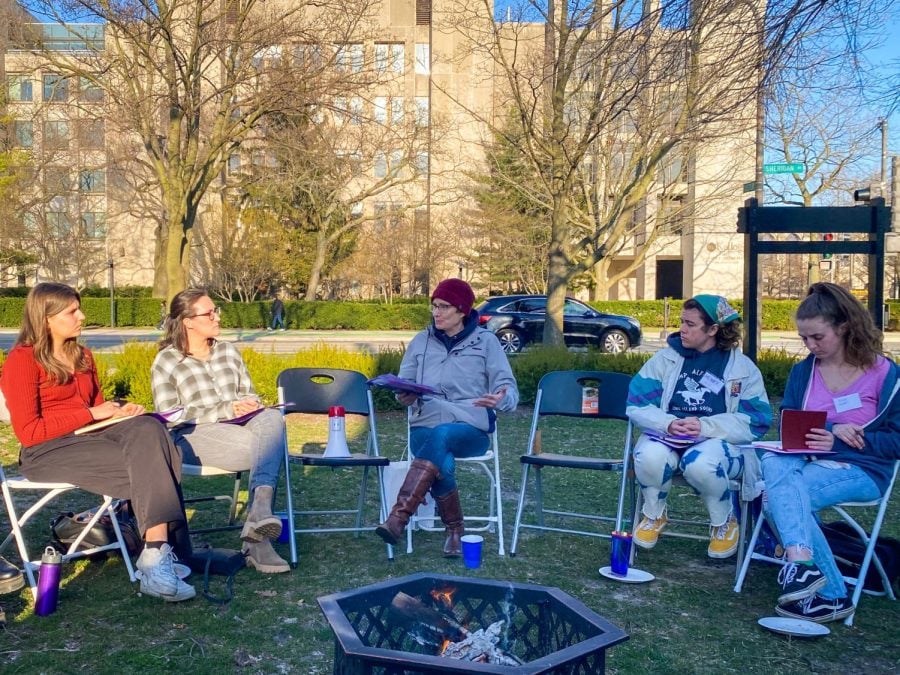NU students, faculty gather for fireside chat on intersectionality and competency in reproductive justice
Samantha Powers/The Daily Northwestern
Students and faculty sit around a campfire and discuss reproductive justice outside the Women’s Center on Monday.
April 10, 2023
Students and faculty gathered by a campfire Monday for a conversation on defining reproductive justice. The event was the first of a four-part series hosted by the Women’s Center, NU Repro and the Gender & Sexuality Studies program.
The event featured three faculty facilitators: legal studies Prof. Joanna Grisinger, Pritzker Prof. Deb Tuerkheimer and history Prof. Kate Masur. All three faculty members have researched the intersection of gender and their respective fields.
Sarah Brown, director of the Women’s Center and an organizer of the event, said the series aims to embody characteristics of successful social movements. The goal of the first session was to inform participants.
“Reproductive justice is really under threat right now, and in order to meet that threat, what are the things that we need to know?” Sarah Brown said. “First, we need to know what we’re talking about. So that’s why this (event) is called ‘Informed.’”
Weinberg senior Maddie Brown helped organize the event. Her American Studies senior thesis studies rhetoric surrounding abortion in the 19th century.
She said defining the term “reproductive justice” helps establish an important framework for future conversations. This was one of the primary goals of the event.
“Reproductive justice goes beyond just access to abortion,” Maddie Brown said. “It’s about access to maternal health care. It’s about fixing maternal mortality rates, especially among Black women and Black communities, and it’s about a holistic approach to health. All of these things that we don’t think about enough.”
Tuerkheimer said reproductive care is especially inaccessible for incarcerated people, transgender people and detained immigrants.
However, she said people should use the political climate following Dobbs v. Jackson Women’s Health Organization to pursue reproductive health reform.
“If there’s anything that we could make of this post-Dobbs apocalyptic landscape, it’s to think more creatively and more imaginatively about what a new world could look like,” Tuerkheimer said. “(We can think about) what we all can do to create that new world that actually provides access to reproductive health for people who’ve never had it.”
Grisinger also said reproductive justice activists shouldn’t look at the post-Roe era through the same lens as the pre-Roe era because both exist in different political contexts.
Now, Grisinger said, there are higher rates of women participating in politics and education as signs of a new era. She said activists are in a “completely different world” now, despite the overturning of Roe v. Wade.
“I think there’s a tendency to be like, ‘Well, this is how the politics played out in 1973,’” Grisinger said. “That’s completely not helpful in any way to be like, ‘Well, I guess it won’t work because it didn’t work (before).’”
Attendee and Weinberg senior Noah Seth said men should also be held accountable to staying engaged with reproductive justice issues.
The group discussed a culture of silence around reproductive justice. Seth said while cisgender men don’t personally understand the importance of the issue, they should still engage in conversations.
“A lot of men feel like, ‘This is not my space, this has nothing to do with me. I don’t have ovaries, so I have nothing to do with this conversation,’” Seth said. “It’s like, ‘Okay, well, that’s all fine and good, but you also make up 50% of the electorate.’ There’s a lot of political and organizational force that we have.”
Email: [email protected]
Twitter: @sqpowers04
Related Stories:
— ‘Taking Action for Reproductive Justice’ to level up community activism
— Social media serves as channel for reproductive justice advocacy
— Thousands gather in Chicago to march for reproductive justice


